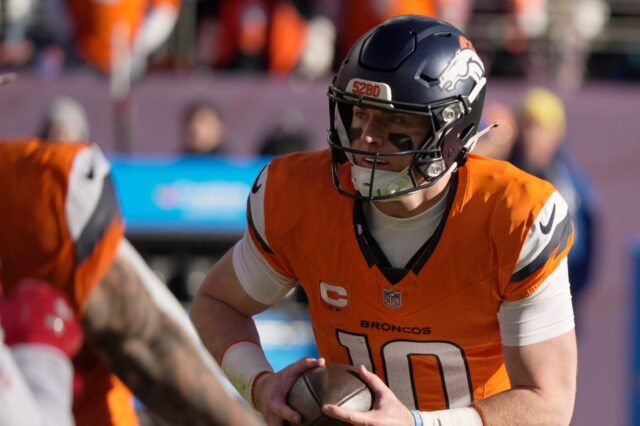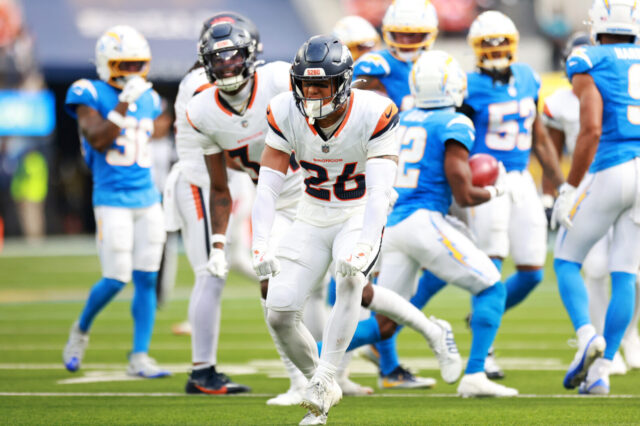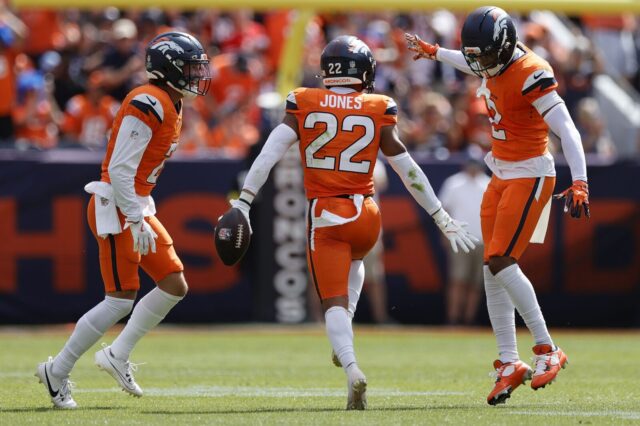Going into the 2016 season, Sylvester Williams already knows how the Denver Broncos value him moving forward into next season — at less than $6.757 million.
A first-round pick in 2013 out of North Carolina, Williams had a fifth-year option for the 2017 season that would have been worth $6.757 million. On May 2, the Broncos chose to decline this option making him a free agent after this season.
Speaking for the first time to the media since then, Williams had a positive attitude on the situation.
“I wasn’t mad about it at all,” said Williams on Thursday after the first week of OTAs. “It was motivating for me … I’m looking forward to the challenge of going out there and playing the best that I can.”
It would be completely understandable if Williams was upset or angry at the situation, but the fact that he is at peace with the Broncos’ decision at first comes off as great, but digging deeper may be concerning.
Last year, the Broncos faced a similar situation with two other defensive linemen — Derek Wolfe and Malik Jackson. While neither had a team option, both were set to be free agents after the season. The Broncos locked up Derek Wolfe with an extension midway through the year, but allowed Jackson to hit free agency.
After a very good season Jackson was the hottest free agent in the country and signed a massive deal with the Jacksonville Jaguars averaging $15 million a year, making Williams $6.757 million option for 2017 seem dirt cheap.
Although Williams and Jackson are not the same player, the similarities are striking. What most Broncos fans seem to forget is Jackson was not a dominating force until last year, and while Williams has not yet been a dominating force, he has consistently been on the rise, starting all 15 regular season games that he appeared in last season.
“My goal is to get better every year. I’m going to go out there every year and improve on last year,” said Williams.
If Williams is able to continue to improve, he could have a dominating season in 2016. Williams knows exactly what he can improve on to become a top free agent after this season.
“I want to play more snaps. I think last year I played around 50 percent of the snaps,” said Williams. “My biggest thing is making more plays. Make big time plays for this team.”
As Williams said, last year he played 48.72 percent of the defensive snaps during the regular season, while Jackson played 75.18 percent of the snaps. This is a substantial difference, but the year before Jackson only played 52.31 percent of the snaps. So, the chance for Williams to have a significant increase in snaps is absolutely possible.
On Thursday, Williams gave some insight as to how the Broncos justified declining his option.
“They said they love me and they love what I did last year. That they thought the number was high for my position, or whatever, and the amount of snaps that I played. And pretty much told me to keep working,” said Williams.
In defensive coordinator Wade Philips’ 3-4 defensive scheme, Williams has been used as a nose tackle; however, his true position, and what he was drafted to be, is a 4-3 defensive tackle, the same position as Jackson. Even though there may not be that big of a difference in the position, there is that big of a difference in price.
For this coming season, the highest salary cap value for a 4-3 defensive tackle will be the Buffalo Bills Marcell Dareus at $14.55 million, while the highest figure for a 3-4 defensive tackle will only be $6.146 million, Kansas City Chiefs Dontari Poe. This is a striking difference in how the two positions are valued and could eventually be the deal breaker in any potential negotiations between the Broncos and Williams.
If the Broncos want to keep Williams after this season, the $6.757 million would be expensive for a nose tackle (3-4 defensive tackle). However, if Williams has a good year this year and the market believes he could be a 4-3 defensive tackle, which he can, then the $6.757 million will seem very cheap.
No one understands this better than Williams.
“At the end of the day, if I have a good year I have the opportunity to make a lot of money, and if I don’t have a good year, which I don’t plan to, I got to go out there and prove myself again,” said Williams. “So at the end of the day, the way I look at it, it benefited me, myself.”
After declining the fifth-year option, the Broncos still have the ability to workout a long-term deal with Williams. If they want to keep him for the long-term, the Broncos may want to take a page out of their own book and lock him up midseason like Wolfe, and not let him hit free agency like Jackson.



